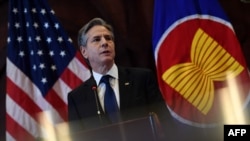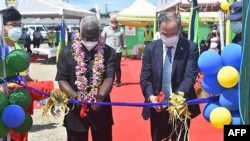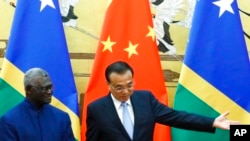President Joe Biden will invite the leaders of Pacific nations to visit the White House later this year, a senior official said Monday, and the United States will escalate efforts to increase ties with the region, sending more diplomats to engage directly with governments across the South Pacific and dedicating staff to work with the troubled Pacific Islands Forum.
The comments from Kurt Campbell, Indo-Pacific coordinator for the National Security Council, came as part of the United States Business Summit, held in New Zealand by the Auckland Business Chamber, and were reported by the Reuters news agency.
Appearing virtually, Campbell said, "For the United States to be effective in the Pacific, we must do more, and we must do more on areas that matter and are of significance to the Pacific Islanders."
Campbell told attendees that the U.S. was planning to send ambassadors to a number of Pacific island nations that have only a minimal U.S. diplomatic presence.
The remarks came just weeks after the Solomon Islands signed a secretive security agreement with China, raising concerns among the U.S. and its allies about Beijing's ability to project military power far east into the Pacific Ocean.
Though the terms of the security pact remain undisclosed, the draft deal allows Chinese warships to dock on the islands, if both sides are in agreement, and for Beijing to send forces to help maintain “social order.”
Solomon Islands as catalyst
The Biden administration has, in recent months, been working hard to engage more closely with governments in the South Pacific in an effort to counter what the U.S. sees as widening Chinese influence in the region.
In December 2021, U.S. Secretary of State Antony Blinken delivered extensive remarks on the administration's plans to expand its outreach to the region, which was characterized as promoting a "free and open Indo-Pacific." Blinken returned to the region in February for another round of talks with senior leaders.
But the Solomon Islands agreement seems to have accelerated U.S. efforts to reconnect with the region, both diplomatically and through legislative action. Multiple bills meant to strengthen the U.S. presence in the Pacific are now pending in Congress.
"This is a complete turnaround from the status quo," said Patricia O'Brien, an adjunct fellow in the Asia Program and Pacific Partners Initiative of the Center for Strategic and International Studies. "For the past 20 years, the United States has been very absent in the Pacific. This has allowed an entree into the Pacific for China, and they've taken that up with alacrity," she told VOA.
"It's taken the wake-up call of China's Solomon Islands deal to get people thinking, 'OK, we can't wait any longer. This is just too, too urgent,'" she said.
"It's not a secret that strategic competition is a driver of an awful lot of U.S. foreign policy these days," said Alan Tidwell, director of the Center for Australian, New Zealand and Pacific Studies at the Georgetown University Walsh School of Foreign Service.
"And that's exactly where this comes from," he told VOA. "You know, oftentimes, the administration — both the preceding administration and the Biden administration — are at pains to say, 'It's not about China. We're really just doing this to engage.' But absolutely, this is very much about China's increased visibility across East Asia and the Pacific."
U.S. warnings
After the deal between China and the Solomon Islands was announced, Campbell led a high-ranking U.S. delegation to the Pacific island nation to discuss an expansion of diplomatic ties and U.S. aid programs.
According to a readout of the meeting provided by the White House, however, the delegation also warned Solomon Islands Prime Minister Manasseh Sogavare about his agreement with China — specifically about allowing Beijing to establish military facilities there.
"If steps are taken to establish a de facto permanent military presence, power-projection capabilities, or a military installation, the delegation noted that the United States would then have significant concerns and respond accordingly," the White House said.
Significant step
Tidwell said that the offer to host South Pacific leaders at the White House is a major step in the Biden administration's ongoing efforts to increase diplomatic ties with the region.
"This is very significant if, in fact, we do see Pacific island leaders coming to the White House," he said.
The last time any heads of state from the region came to the White House was in 2019, when the leaders of Micronesia, Marshall Islands and Palau made the journey.
"The idea that we would expand that group to include South Pacific leaders is a big deal," said Tidwell.
Pacific Islands Forum addressed
In his remarks Monday, Campbell also addressed the status of the Pacific Islands Forum, an intragovernmental group promoting cooperation and security in the region.
Until recently, the forum was made up of 18 states: Australia, Cook Islands, Fiji, French Polynesia, Kiribati, Marshall Islands, Micronesia, Nauru, New Caledonia, New Zealand, Niue, Palau, Papua New Guinea, Samoa, Solomon Islands, Tonga, Tuvalu and Vanuatu.
After a dispute over the leadership of the forum erupted in February 2021, five members — Kiribati, Marshall Islands, Micronesia, Nauru and Palau — announced that they would be leaving the organization. However, last month they announced that their departure has been "paused" indefinitely.
According to Reuters, Campbell told his audience in Auckland that the United States was "optimistic" about the future of the Pacific Islands Forum, and would increase the number of U.S. diplomats assigned to work with it.









